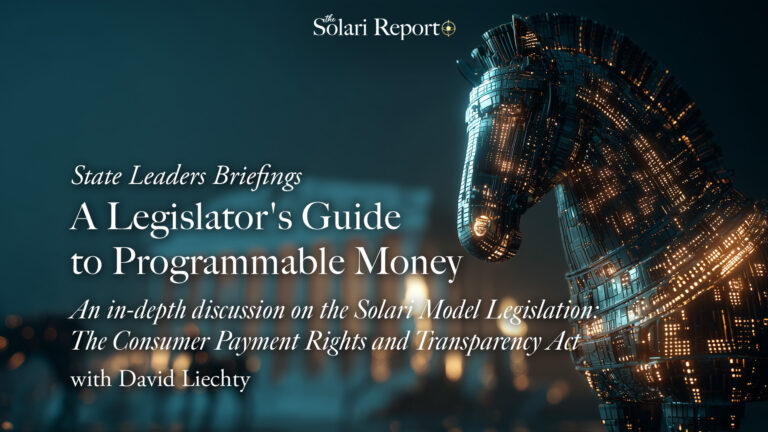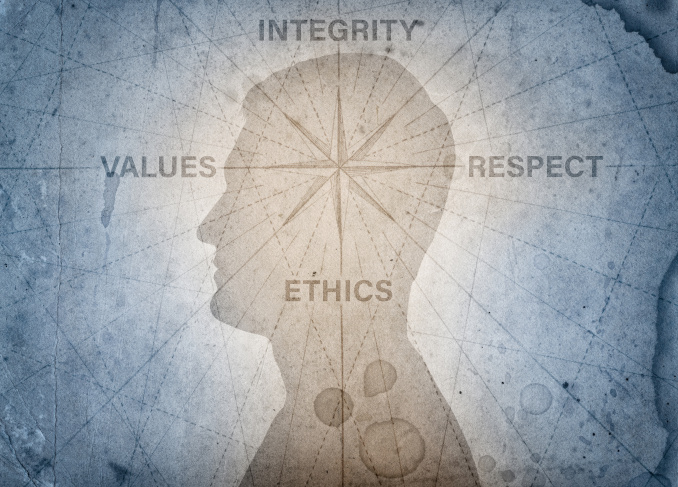Subscriber Resources – Interview Audios
Listen to the Interview MP3 audio file

Download the Interview MP3 audio file

Read the transcript of Integrity #38; Access to Divine Intelligence with Thomas Meyer
“The object of life is not to be on the side of the majority, but to escape finding oneself in the ranks of the insane.”
~ Marcus Aurelius, Meditations
By Catherine Austin Fitts
I used to live in a first-world country. If I picked up the phone and made a call, it went through. If someone said they would come by to pick up a package by noon, I could count on it. If a stranger came to my house, they had a social or civil purpose—something other than picking up extra cash by turning me in for a regulatory violation or reporting on my personal habits to someone who slipped them money on the digital smartphone. If I bought a package of meat or fish in the supermarket, I did not worry about whether it was real and whether or not it was safe to eat. If I went outside to ride my bike or go for a jog, I did not have to give up and come back indoors because the spraying of heavy metals was so heavy that I couldn’t exercise without coughing. Nor was I required to pretend such things were not happening to maintain my social standing.
For reasons that we cover regularly on The Solari Report, most of us are swimming in a sea of environmental, legal, regulatory, and cultural pollution. These problems, along with the explosion of new technology and technocracy around us, make it easy to become frustrated and let our standards go-acculturating to a debasement of standards.
Seeking integrity demands that we maintain a high learning metabolism; this can be time-consuming and also requires greater reliance on others to help us understand and deal with fast-unfolding developments. However, integrity is also its own reward. If we do our best to maintain integrity in our individual dealings and try to limit our dealings to people and institutions that do their best to maintain integrity, it increases our ability to access divine intelligence. In short, integrity is a pathway with which we can access a much greater power—one that the hypermaterialists and transhumanists (or subhumanists as Thomas Meyer calls them) around us cannot access. It is a power that we need – and that is ever more delightful to access in these trying circumstances.
Thomas and I discussed these issues earlier this year in our interview on the Story of Gideon. This included a discussion of the “Midianite” phenomenon—something we are watching with the Epstein affair, the suiciding of New York policemen, and mob wars breaking out across the planet.
I was just in Basel for another week with Thomas—what a privilege this was! Thomas took time out from his busy schedule publishing The Present Age, leading his fascinating circles and salons and lecturing around the world (just back from Finland, next headed to China) to speak with me about integrity. How do we nurture our integrity and that of those around us? The rewards of maintaining integrity—which I define as both competency and ethics—are significant.
I always leave my discussions with Thomas refreshed and restored.
Our Blast from the Past this week is The Future of Europe—my discussion with Thomas Meyer in early 2018.
Our movie this week is Loving Vincent—a remarkable animation of the life of Vincent Van Gogh. It is the first painted animated feature film ever made. You can read more about Van Gogh in Nina Heyn’s Food for the Soul columns covering our visit to the Van Gogh museum in Amsterdam this past spring and on the Paris digital exhibit we will see in September.
Subscribers can e-mail or post questions and story suggestions for Money & Markets for this week here.
Not a subscriber yet? You are invited to join here!






















































































































I did not know we are living in the Age of Michael. I have been busy mapping the darkness to be able to see it I temporarily set aside studying Steiner.
This was exactly what I wanted and needed to hear.
Thank you Catherine and Thomas.
🙂
I did not know we are living in the Age of Michael. I have been busy mapping the darkness to be able to see it I temporarily set aside studying Steiner.
This was exactly what I wanted and needed to hear.
Thank you Catherine and Thomas.
🙂
I always enjoy your discussions with Thomas. Recently I have been watching a series of lectures by Brian Gray, a teacher at Rudolf Steiner College, on the Philosophy of Freedom. Brian is able to explain Steiner in a fascinating way.
http://philosophyoffreedom.com/brian-gray-lectures
Thanks for the link, Christine.
Thanks, Christine!
I always enjoy your discussions with Thomas. Recently I have been watching a series of lectures by Brian Gray, a teacher at Rudolf Steiner College, on the Philosophy of Freedom. Brian is able to explain Steiner in a fascinating way.
http://philosophyoffreedom.com/brian-gray-lectures
Thanks for the link, Christine.
Thanks, Christine!
I enjoyed your interview with Thomas Meyer. I have been convinced that it is absolutely essential for all of us to discover what is good in our universe. We are all surrounded by evil and have no real way to fight it in a material way. If we cannot understand spiritual holiness we will not be able to withstand all of this.
This is also very difficult. Is literal belief in the bible necessary? Most of the people in the world have lost confidence in the church and really do not know where to look. Your experiences of doing the right thing under extreme pressure and having doors open to you is very interesting and uplifting.
I do not believe that literal belief in the bible is necessary. When I studied the Bible we were required to read the parts that were edited out, including the Book of Thomas and the Book of Enoch. I spent quite a while reading the Essenes. I do not believe any book literally which was edited by both the Vatican and Church of England. 🙂
There is a tremendous amount that can be gained from reading and studying spiritual texts. You just have to make your way with prayer and discernment and do your best to screen out the efforts to use your hunger for the divine to control and manipulate you.
There are lot of great preachers. You don’t have to agree with everything to learn tremendous amounts.
What had the most impact for me was the actual experience of operating by faith rather than sight. This is where the great preachers helped me. They really somehow instilled the important lessons and related scripture in my spirit.
Good place to start – Pastor Tim Keller’s series on Proverbs. You used to be able to get it on his website. Series of 20+ audios. Amazing.
The bible paints a very consistent picture of who God is, who we are, who the enemy is, and what we need to do in this life to be saved.A lot of that you seem to be throwing out but holding on to some other things. This is foreign to me and I am sure a lot of others with a similar background. I and many others think you either accept it all or reject it all. Are you saying that each person has to develop the discernment to figure out the truth on their own if they are to make any progress in this life?
If I could only take one book with me to read for the rest of my life it would be the Bible. So I hold it in very high esteem. However, any book that was edited by the Church of England and the Vatican is a book to be read with discernment. We are each sovereign individuals and we are responsible for what we believe, what we know, and what we do – and to the extent possible integrating those three.
If you look at the people who edited the Bible as well as those who run the churches and the related endowments that use the Bible, their behavior clearly indicates that they don’t practice what the Bible says. To me that means they don’t understand it, let alone believe it.
I don’t think accepting the Bible is a 0 or 1 proposition. I believe I am responsible to create a direct relationship with God – and that is my primary source. I read the Bible for guidance and understanding. I agree with much. I believe some very important things were edited out – my chief concern with the Bible is material omissions – and some I don’t understand. I never worry about the parts I don’t understand – I figure I have enough in this lifetime to try to live up to the teachings of Christ and embracing the covenant of Grace.
Joseph thinks I would be much better off if I could take time and seriously study theology. I agree with him – question is when/how to create the time. I just got the Complete Works of Aquinas – they are in the pile.
In the meantime, my focus is to do a better job of living according to Christ. I see enormous opportunity for improvement. For me, Christ’s teachings are best understood by living them.
It’s a humbling experience.
I enjoyed your interview with Thomas Meyer. I have been convinced that it is absolutely essential for all of us to discover what is good in our universe. We are all surrounded by evil and have no real way to fight it in a material way. If we cannot understand spiritual holiness we will not be able to withstand all of this.
This is also very difficult. Is literal belief in the bible necessary? Most of the people in the world have lost confidence in the church and really do not know where to look. Your experiences of doing the right thing under extreme pressure and having doors open to you is very interesting and uplifting.
I do not believe that literal belief in the bible is necessary. When I studied the Bible we were required to read the parts that were edited out, including the Book of Thomas and the Book of Enoch. I spent quite a while reading the Essenes. I do not believe any book literally which was edited by both the Vatican and Church of England. 🙂
There is a tremendous amount that can be gained from reading and studying spiritual texts. You just have to make your way with prayer and discernment and do your best to screen out the efforts to use your hunger for the divine to control and manipulate you.
There are lot of great preachers. You don’t have to agree with everything to learn tremendous amounts.
What had the most impact for me was the actual experience of operating by faith rather than sight. This is where the great preachers helped me. They really somehow instilled the important lessons and related scripture in my spirit.
Good place to start – Pastor Tim Keller’s series on Proverbs. You used to be able to get it on his website. Series of 20 audios. Amazing.
The bible paints a very consistent picture of who God is, who we are, who the enemy is, and what we need to do in this life to be saved.A lot of that you seem to be throwing out but holding on to some other things. This is foreign to me and I am sure a lot of others with a similar background. I and many others think you either accept it all or reject it all. Are you saying that each person has to develop the discernment to figure out the truth on their own if they are to make any progress in this life?
If I could only take one book with me to read for the rest of my life it would be the Bible. So I hold it in very high esteem. However, any book that was edited by the Church of England and the Vatican is a book to be read with discernment. We are each sovereign individuals and we are responsible for what we believe, what we know, and what we do – and to the extent possible integrating those three.
If you look at the people who edited the Bible as well as those who run the churches and the related endowments that use the Bible, their behavior clearly indicates that they don’t practice what the Bible says. To me that means they don’t understand it, let alone believe it.
I don’t think accepting the Bible is a 0 or 1 proposition. I believe I am responsible to create a direct relationship with God – and that is my primary source. I read the Bible for guidance and understanding. I agree with much. I believe some very important things were edited out – my chief concern with the Bible is material omissions – and some I don’t understand. I never worry about the parts I don’t understand – I figure I have enough in this lifetime to try to live up to the teachings of Christ and embracing the covenant of Grace.
Joseph thinks I would be much better off if I could take time and seriously study theology. I agree with him – question is when/how to create the time. I just got the Complete Works of Aquinas – they are in the pile.
In the meantime, my focus is to do a better job of living according to Christ. I see enormous opportunity for improvement. For me, Christ’s teachings are best understood by living them.
It’s a humbling experience.
Another fascinating book: The Fellowship, The lives of the Inklings, J.R.R. Tolkien, C.S. Lewis, Owen Barfield, Charles Williams
by Philip & Carol Zaleski
The Inklings discussed literature, religion, and ideas; read aloud from works in progress; took philosophical rambles in woods and fields; , enjoyed companionship and criticism; and in the process, rewrote the cultural history of modern times.
Sounds wonderful